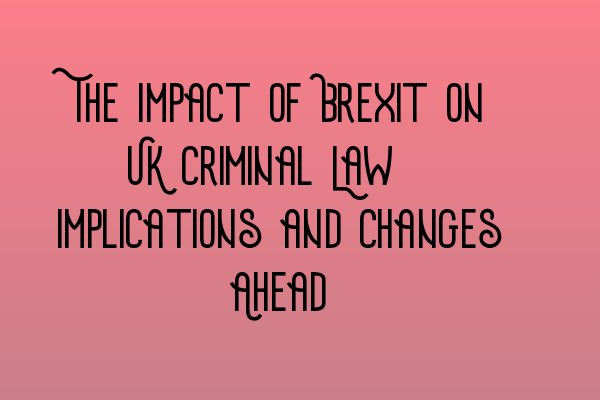The Impact of Brexit on UK Criminal Law: Implications and Changes Ahead
As the UK’s departure from the European Union continues to shape the country’s legal landscape, the impact of Brexit on various areas of law cannot be ignored. One important aspect that has garnered significant attention is the effect of Brexit on UK criminal law. In this article, we will explore the implications and changes that lie ahead in the realm of criminal law.
1. Changes in Extradition Arrangements
One of the key concerns in the post-Brexit era is the potential impact on extradition arrangements with EU member states. Currently, the European Arrest Warrant (EAW) allows for the swift extradition of suspects between EU countries. However, with Brexit, the UK will lose access to this mechanism, leading to a need for alternative arrangements to be negotiated.
2. Revision of Mutual Legal Assistance (MLA)
Alongside changes in extradition, Brexit will also require a revision of Mutual Legal Assistance (MLA) frameworks. MLA is crucial for cross-border cooperation in criminal investigations, including the exchange of evidence and intelligence. The UK will need to establish new agreements to ensure continued cooperation and information-sharing with EU counterparts.
3. Impact on Cross-Border Investigations
Brexit is likely to introduce complexities and challenges in cross-border investigations. Previously, EU law facilitated seamless cooperation between law enforcement agencies across member states. However, the absence of automatic recognition of each other’s judicial decisions may hinder the efficiency of investigations. Strategies for addressing these challenges will need to be developed.
4. Changes in EU Data Protection Laws
In addition to the procedural aspects of criminal law, Brexit will also impact data protection laws. The General Data Protection Regulation (GDPR), which currently governs data processing and privacy across the EU, will no longer be directly applicable to the UK. As a result, the UK will need to establish its own data protection laws, potentially leading to changes in how data is accessed and shared during criminal investigations.
In conclusion, Brexit will undoubtedly have a profound impact on UK criminal law. From changes in extradition arrangements and revision of mutual legal assistance frameworks to challenges in cross-border investigations and adjustments in data protection laws, the implications are far-reaching. As legal professionals, it is important to stay informed and adapt to the evolving legal landscape.
